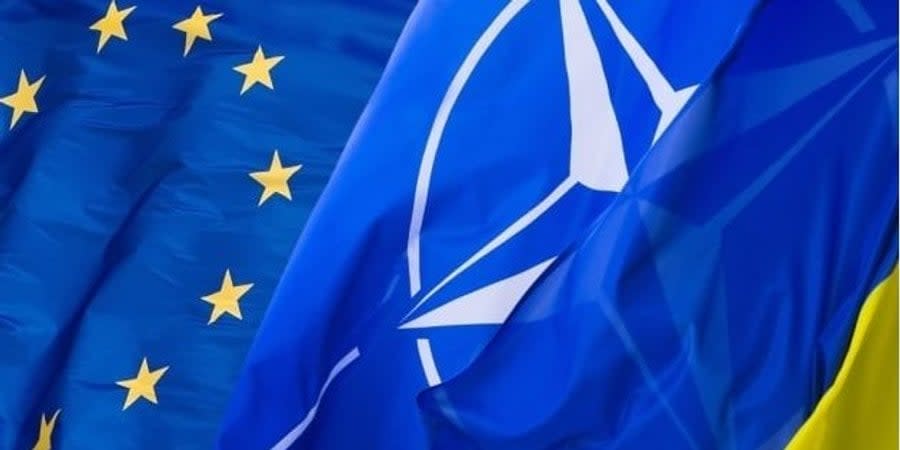KSF experts assess Ukraine's EU and NATO prospects in 2024

The year 2023 is ending on an encouraging note for Ukraine, as the EU had made its historic decision to begin membership talks with Kyiv. At the same time, Ukraine has yet to receive even a conditional invitation to join NATO.
Political analysts from the Kyiv Security Forum (KSF) provided NV with an assessment of Ukraine's prospects for EU and NATO membership paths in 2024.
Read also: Yatsenyuk urges clear signal to Putin at Kyiv Security Forum
The EU's decision demonstrates Brussels' firm political commitment to Ukraine's membership. This is no longer a mere prospect of membership that may or may not materialize one day under favorable circumstances. It is a process that should result in accession if Kyiv meets the standards.
We owe this success to the fact that the once skeptical leaders of France, Germany, Italy, and their closest Western European allies not have only realized their mistakes but also became active and effective advocates of Ukraine's European integration. But there may be some difficulties here, especially with the idea of a so-called gradual integration into the EU. This could lead to an artificial delay in the accession process.
Northern Europe maintains its traditional commitment and support. On the other hand, Eastern Europe, while continuing to support Ukraine at the political level, is beginning to block our economic opportunities under pressure from certain political and professional groups.
EU accession negotiations will be difficult
Ukraine has the potential to become a strong competitor both in the production of goods, especially in the agricultural sector, and in the provision of services. While there is an obvious political component to the blocking of Ukrainian grain supplies and freight transportation from the European market by our neighbors, primarily Poland, these processes have highlighted objectively problematic aspects of Kyiv's integration into the EU. These and many other issues need to be resolved through negotiations and mutually acceptable compromises. The main thing is that the EU's strategic vision of its future should outweigh the local interests of certain groups.
Read also: ‘We can block it 75 more times’ – Orban continues to threaten to halt Ukraine's EU accession process
The allocation of funds from the EU's general budget, particularly under the Common Agricultural Policy and the Equalization Policy, could also become a potential problem. Given its size, agricultural development, and low standard of living, Ukraine could cause a radical reduction in funds for other member states that have traditionally received them. The EU is aware of this, which is why the EU reform process is gaining momentum in parallel with the accession negotiations. This shows that Brussels is serious about the bloc's next wave of enlargement.
EU reforms could also influence the decision-making process, preventing individual member states with radical positions from blocking important steps.
The offer to Hungarian Prime Minister Viktor Orbán to help himself to a "coffee" during the vote on beginning Ukraine's EU accession talks may no longer be a groundbreaking diplomatic maneuver, but instead become part of the EU's official procedures.
NATO's Vilnius Summit a Disappointment
Ukraine did not receive an invitation to join the Alliance, not even a conditional one that was postponed until after the war.
Read also: Ukraine's true NATO integration kicked off after Vilnius summit — UA Minister
NATO leaders decided that Ukraine would not be required to go through the MAP (membership action plan - ed.) stage on its way to membership, and formed the NATO-Ukraine Council (NUC) instead of the NATO-Ukraine Commission (NUC) – the main difference being the provision of equal rights on the council to NATO members and Ukraine. Although these decisions do not seem historic against the background of many years of work within the NUC and the implementation of various annual national plans, they were nevertheless useful. The equality of rights in the NUC has made Hungary's attempts to block its work irrelevant, and the removal of political issues (including those related to the rights of national minorities) from the adapted annual national program and their transfer to the EU level has deprived Budapest of the ability to artificially block Ukraine's accession to NATO on the basis of dissatisfaction with the rights of Hungarians in Ukraine.
Recent statements by U.S. President Joe Biden indicate that the negative U.S. attitude towards extending a NATO invitation to Ukraine has not changed. This casts doubt on the decision to be taken at the next NATO summit in Washington in July 2024. According to Biden, "NATO will be present in Ukraine's future", but "we have to make sure that they [the Ukrainians] win the war".
Compromise proposals put forward by prominent American experts to invite Ukraine to start membership negotiations in Washington while postponing a final political decision on NATO accession until the end of the war or make it subject to discussions on the Ukrainian territory to be covered by Article V guarantees, as indicated by the suggestion of former NATO Secretary General Anders Fogh Rasmussen that Ukraine could join NATO without the occupied territories, have not yet found a response in the White House.
The Kyiv Security Forum, founded by the Arseniy Yatsenyuk Open Ukraine Foundation, is the country's leading international platform for discussing national and global security issues.
We’re bringing the voice of Ukraine to the world. Support us with a one-time donation, or become a Patron!
Read the original article on The New Voice of Ukraine

